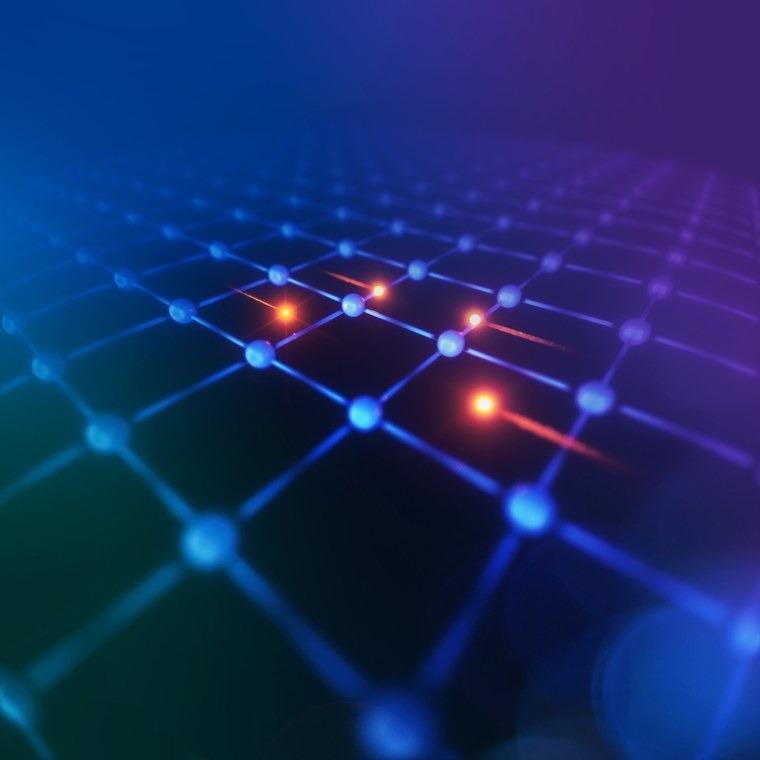Dissipationless electric energy transport — also called superconductivity — is considered an inspiration for the energy sector. Since its discovery over a century ago, researchers globally have been exploring this distinguished quantum occurrence, which, however, needs the electrons in metals to be cooled to ultra-low temperatures.
 A four-part electron family creates a completely new state of matter in a metal. Researchers from the Dresden-Würzburg Cluster of Excellence ct.qmat have demonstrated this unusual phenomenon for the first time worldwide. Image Credit: Technische Universität Dresden
A four-part electron family creates a completely new state of matter in a metal. Researchers from the Dresden-Würzburg Cluster of Excellence ct.qmat have demonstrated this unusual phenomenon for the first time worldwide. Image Credit: Technische Universität Dresden
Researchers from the Cluster of Excellence ct.qmat–Complexity and Topology in Quantum Matter at the Universities of Dresden and Würzburg have recently made an extraordinary discovery: In some superconducting metals, a compound of four electrons guarantees that a totally new state of matter is developed.
So far, only electron pairs were seen as playing a role in superconductivity. The discovery by the researchers guided by Prof. Hans-Henning Klauss of Technische Universität Dresden is therefore considered a landmark for materials research. The study findings have been reported in the journal Nature Physics.
Electron Family Surprises Researchers
In quantum physics, superconductivity, discovered years ago in 1911, is perhaps the best-known occurrence to date. Its theoretical basis has been understood since the 1950s. It is vital that electrons at ultra-low temperatures no longer travel via a metal separately but as pairs. Electron pairs do not collide with the atomic lattice so that they can transmit their charge without any energy loss.
When the Dresden scientists guided by Henning Klauss experimentally examined the superconducting metal Ba1-xKxFe2As2 from the group of iron pnictides, at first, they suspected an error.
When we discovered that suddenly four electrons instead of two were forming a bond, we first believed it was a measurement error. But the more methods we used to confirm the result, the clearer it became that this had to be a new phenomenon: all data are consistent with the same result.
Prof. Hans-Henning Klauss, Study Lead and Physicist, Technische Universität Dresden
“Now we know that the four particle electron family in certain metals creates a completely new state of matter when cooled to ultra-low temperatures. What this will lead to in the future will become clear over the next few years," Hans-Henning Klauss added.
Results Tested for More Than Two Years
About a decade ago, it was theoretically projected that there could be a rare state of matter in some superconducting metals, in which four rather than two electrons play a role. The international team of the Cluster of Excellence ct.qmat has currently delivered the first experimental proof. It was examined using seven different techniques across two years.
We first discovered the new state of matter in a Swiss particle accelerator. We were then able to confirm our results with six other methods on site in Dresden and at Stockholm University. The great location advantage of Dresden is the short distances: I can bring my sample almost on foot to a Leibniz Institute or Helmholz Center.
Dr. Vadim Grinenko, Study Lead Experimenter, Technische Universität Dresden
The theoretical interpretation of the measurement results was carried out by the Swedish physicist Prof. Egor Babaev.
New Type of Superconductivity Possible
The finding of iron pnictides as a group of materials mainly suitable for superconductivity already prompted an international research boom in materials science and physics since 2008. The energy sector is highly optimistic regarding the popular quantum occurrence since up to 15% of energy is lost in traditional energy transport due to transport resistance.
"If you could actually transport electricity across the country in superconducting metals at room temperature, about ten large power plants would be superfluous right away," says Klauss.
However, regular research — such as Prof. Klauss' — is focused on comprehending the underlying physics and can, at best, theorize about future applications.
One can assume that our results will lead to a whole new line of research, looking for other metals with four connected electrons, for example, or exploring how materials need to be changed to create an electron family.
Prof. Hans-Henning Klauss, Study Lead and Physicist, Technische Universität Dresden
"In purely theoretical terms, a whole new type of superconductivity would also be possible with our electron family. The only thing that is certain is that iron pnictides are well suited for technologies such as quantum sensors due to their new aggregate state," Klauss added.
International Participation
Besides Prof. Hans-Henning Klauss, Dr. Vadim Grinenko of TU Dresden and Prof. Egor Babaev of the Royal Institute of Technology in Stockholm were significantly involved in the present research conclusions.
The experiments were conducted at the Swiss Paul Scherrer Institute in Villigen as well as at the Leibniz Institute for Solid State and Materials Research in Dresden, the high-field magnet laboratory of the Helmholtz Center Dresden-Rossendorf and the AIST Institute in Tsukuba in Japan.
Journal Reference:
Grinenko, V., et al. (2021) State with spontaneously broken time-reversal symmetry above the superconducting phase transition. Nature Physics. doi.org/10.1038/s41567-021-01350-9.